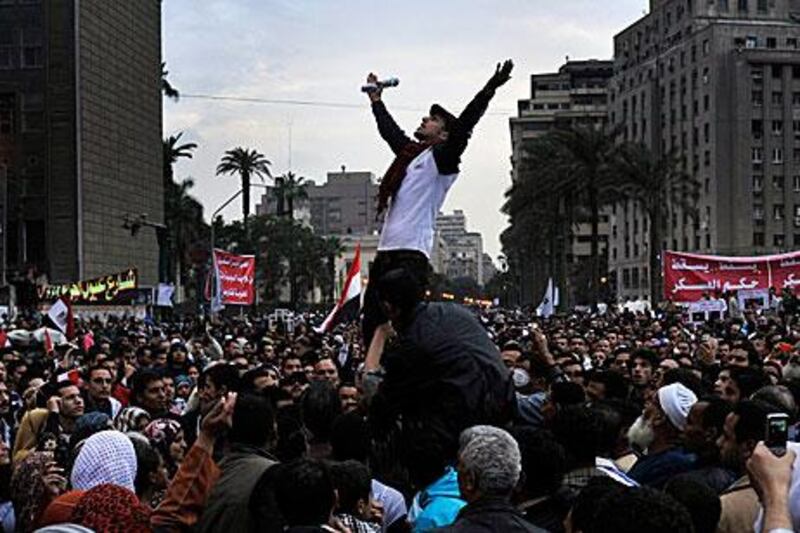CAIRO // The vote in Egypt was being billed by some as the battle of the eye versus the scales of justice.
Egyptians today and tomorrow will begin choosing a new representative government, with 55 political parties and scores of individual candidates in the running.
But the real competition will be between the secular Egypt Bloc and the Islamist Democratic Alliance.
With an estimated half of the country illiterate, many voters will choose by selecting symbols attributed to the parties by the electoral commission.
The Egypt Bloc is represented by the eye symbol, while the Democratic Alliance, led by the Muslim Brotherhood-controlled Freedom and Justice Party, has the scales of justice symbol.
"It's a vote about how people will live in Egypt for the years to come," said Heba Hagrass, a candidate in the Qasr Al Nil district for the Free Egyptians party. "I tell everyone I meet - drivers, shopkeepers, my friends - that this is about the shape of the country.
"There hasn't been time to judge the parties, so you have to vote Islamist or the Egypt Bloc."
With major policy differences largely absent, the vote has zeroed in on issues of morality and the role of religion in the state.
The new parliament's first job will be to create a 100-member assembly to rewrite the constitution.
The elections would have been complex and meaningful enough on their own, but the legitimacy of the voting is under threat as well.
A small group of protesters in Tahrir Square on November 19 has coalesced in the last week into a full-fledged sit-in opposed to the military caretaker government.
Thousands gathered again yesterday in the square in what organisers dubbed the "Legitimacy of the Revolution" protest, demanding the Supreme Council of the Armed Forces (Scaf) hand power to a civilian government headed by Mohamed ElBaradei, a potential presidential candidate.
Analysts describe the country as being on a knife's edge. If the elections are able to put in place a representative government, the huge risk of polarisation could ease.
If violence breaks out and voting irregularities emerge, it could spell a dangerous era in the Arab world's most populous country and serve as a cautionary tale of regime change amid the revolutionary spirit that has spilt across the region.
Field Marshal Hussein Tantawi, the head of Scaf, warned yesterday about the need for the elections to go smoothly.
"We will not allow troublemakers to meddle in the elections," he said, echoing statements in previous days that painted the military as the guardian of the country's "silent majority" who want stability.
"Egypt is at a crossroads - either we succeed politically, economically and socially or the consequences will be extremely grave and we will not allow that," said Mr Tantawi.
He accused "foreign hands" of meddling in Egypt's transition and said Scaf would "not allow a small minority of people who don't understand to harm Egypt's stability".
The political group with the most to gain in the parliamentary elections over the next three-and-a-half months for the People's Assembly and Shura Council is the Freedom and Justice Party, which is controlled by the Muslim Brotherhood.
In the Brotherhood's more than 80 years of existence, it has never been so close to political power.
Banned by Hosni Mubarak's regime, it was the first group to create a certified political party after Mr Mubarak resigned in February.
The party is expected to win more than 40 per cent of seats, if not a full majority. But the group has been plagued by defections to other Islamist parties and has had trouble navigating the political sphere.
Liberal organisations point to the Brotherhood's lack of support for the protests in Tahrir Square as evidence of what they call its craven hunger for power, even at the expense of the people. While several liberal groups have said they would boycott the elections, the head of the Freedom and Justice Party, Mohamed Morsi, called on Egyptians to vote today as a patriotic duty.
"It is significant that all Egyptians, [the] source of legitimate power, take part and cast their votes in the parliamentary elections, to protect and ensure success of the democratic process," he said on Twitter.
Even some Tahrir Square protesters on Friday said that while they supported the rallies against the military, they still planned to vote for the Freedom and Justice Party.
"We came to the square with our sisters because of the need for equality and justice," said Asmaa Mohammed, a student at Cairo University. "But I am still going to vote and I think that the Freedom and Justice Party are good because they follow the Quran."





